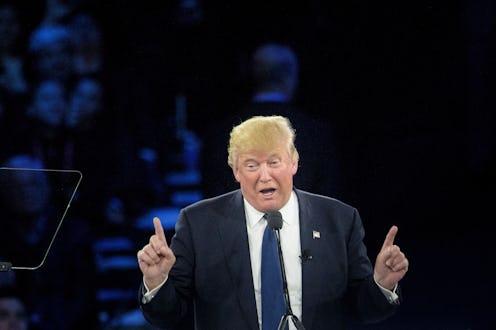News
Trump Could Win Enough Delegates To Avoid This
The odds of the Republican Party being forced into a contested convention are steadily creeping upwards. Donald Trump is leading the field, but it’s still quite possible that he’ll fall short of the 1,237 delegates needed to clinch the nomination. So, will Trump win enough delegates to avoid a contested convention? All available evidence suggests that it’s going to be really, really close. FiveThirtyEight conducted a survey of several forecasters, and on average, they concluded that Trump is likely to fall 29 delegates short of the magic number. According to Larry Sabato’s well-respected forecasting site, though, Trump is on track to win 1,239 delegates — just two (!) delegates over the threshold. So yeah, it’s going to be pretty damn close.
There’s a wrinkle to this, though. If Trump fails to win 1,237 delegates but comes very close, he still has a chance to wrap up the nomination and avoid a contested convention. That’s because some Republican delegates will be unbound, free to vote for whomever they want, and they could help Trump eke out a win.
In Pennsylvania, for example, 54 delegates will be uncommitted regardless of how the state votes in the primary. A lot of delegates are pledged to vote for candidates who’ve withdrawn from the race, like Marco Rubio, and some of them will become unbound as well. And at least one GOP official has claimed that all of the delegates will technically be unbound when the convention starts, though this is not the consensus interpretation of RNC rules.
Regardless, if Trump comes close to winning 1,237 delegates in the primaries, he’ll only need to win over a fraction of unbound delegates to bring him over the threshold. If that happens, he’ll win the nomination on the first ballot and avoid a contested convention. From this narrow perspective, it would be tempting to conclude that Trump has a bit of breathing room insofar as the delegate math goes. But we should resist that temptation.
Yes, it’s true that Trump could fall slightly short of 1,237 and still win the nomination outright. But in an extremely close race, no candidate has much room for error, regardless of their position relative to one another. Even the smallest deviation from the polls in a single state could make all of the difference in a situation like this, and that’s most definitely true for Trump.
Take California, which is worth a monster 172 delegates in the Republican primary. FiveThirtyEight’s prediction model gives Ted Cruz a miniscule, 2 percent edge over Trump in the Golden State. But California allocates its delegates in part based on the vote in individual congressional districts, and it’s basically impossible to predict how heavily Democratic-leaning districts will vote in the Republican primary. The Republican nomination, then, could be determined by conservative voters in the most liberal parts of a blue state.
Wisconsin could also play a pivotal role. RealClearPolitics’ polling average has Trump with a modest five-point lead over Cruz, but FiveThirtyEight’s weighted forecast gives Cruz the edge. It’s anyone’s guess who will win, and because the state is winner-take-all state, it’s equally unclear who will walk away with every one of the state’s 42 delegates.
There’s so much uncertainty across the board that none of the campaigns can take anything for granted. And neither can pundits or voters, for that matter. At this point in the race, only one outcome is overwhelmingly likely: a very close race that comes down to the wire.
